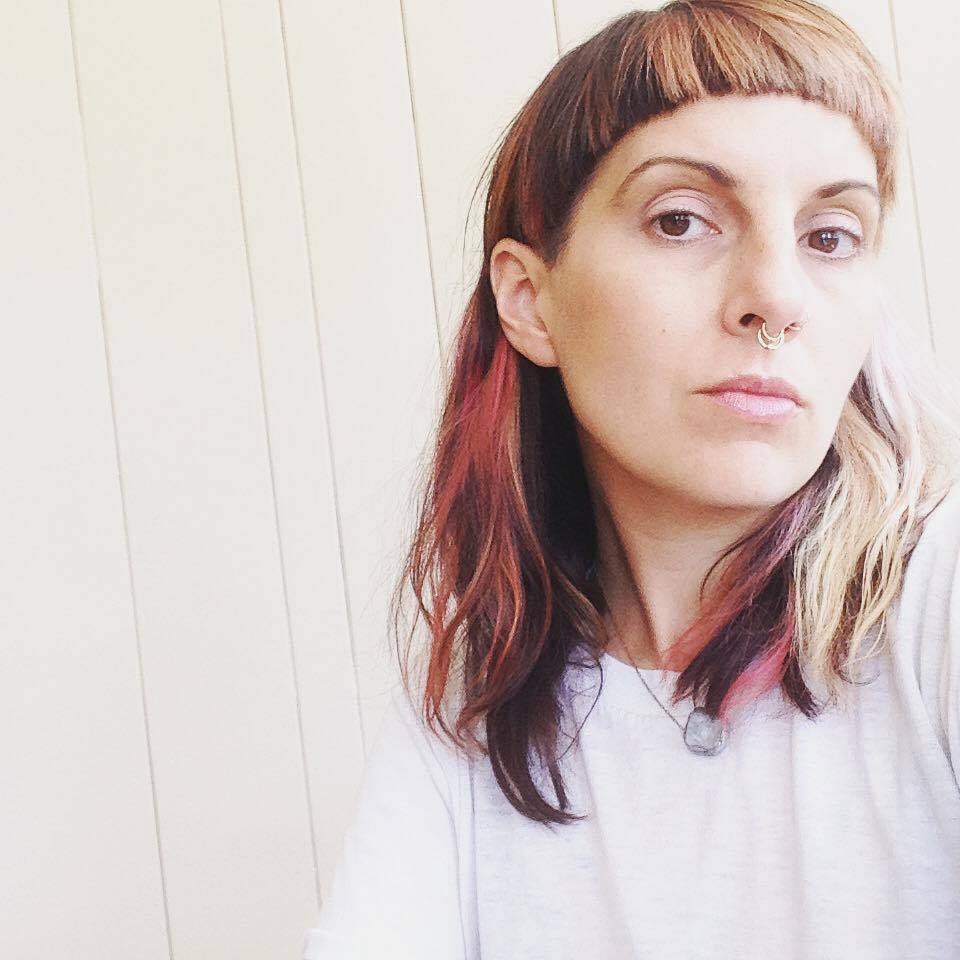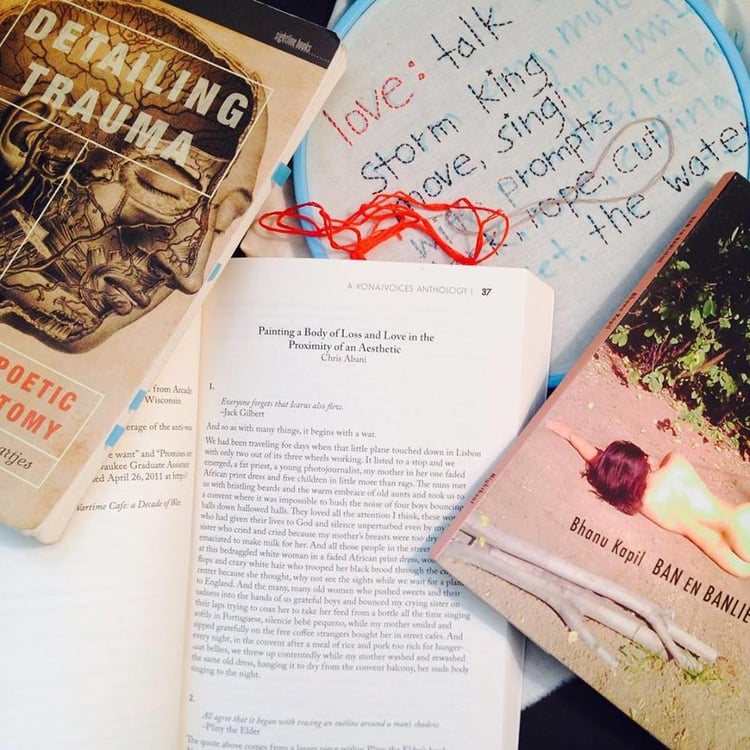An Open Call for Muslim Writers, Black History Month, and More
Hillary Clinton to publish book of essays in the fall; New York City and BuzzFeed Books launch “One Book, One New York”; the political cartoons of Dr. Seuss; and other news.
Jump to navigation Skip to content
Hillary Clinton to publish book of essays in the fall; New York City and BuzzFeed Books launch “One Book, One New York”; the political cartoons of Dr. Seuss; and other news.
“I just really wanted my words back—it was the one thing I lost, and it was the one thing I wanted back.” In the book trailer for her debut memoir, Tell Me Everything You Don’t Remember: The Stroke That Changed My Life (Ecco, 2017), Christine Hyung-Oak Lee describes experiencing a stroke and how writing contributed to her recovery.
Last month, “bundespraesidentenstichwahlwiederholungsverschiebung” was voted Austria’s word of the year, which roughly translated means “postponement of the repeat runoff of the presidential election.” Likewise, words tied to politics such as “xenophobia,” Dictionary.com’s word of the year; Oxford Dictionaries’ term for 2016, “post-truth;” and Merriam-Webster’s plea for users to stop looking up the word “fascism” to prevent it from becoming its word of the year (“surreal” was the eventual winner) reflected what was on everyone’s minds last year. What was your word of the year for 2016? Write a short essay where you explore your interactions with that word and its meaning. Look up the word’s etymology for a deeper exploration.
PEN America announced on Wednesday the finalists for the 2017 PEN Awards. The annual awards are given for books of poetry, fiction, nonfiction, and translation published in the previous year. This year PEN America will award nearly $315,000 to writers, including the inaugural $75,000 PEN/Jean Stein Book Award, given for a “book of extraordinary originality and lasting influence.”
The finalists are:
PEN/Jean Stein Book Award: A prize of $75,000 given annually to recognize a book-length work in any genre for its originality, merit, and impact.
Known and Strange Things (Random House) by Teju Cole
Olio (Wave Books) by Tyehimba Jess
The Return: Fathers, Sons and the Land in Between (Random House), Hisham Matar
Dark Money (Doubleday) by Jane Mayer
The Underground Railroad (Doubleday) by Colson Whitehead
PEN/Robert W. Bingham Prize for Debut Fiction: A prize of $25,000 given annually to an author whose debut work—a first novel or collection of short stories published in the previous year—represents distinguished literary achievement and suggests great promise of a second work of literary fiction.
Insurrections (University Press of Kentucky) by Rion Amilcar Scott
We Show What We Have Learned (Lookout Books) by Clare Beams
The Mothers (Riverhead Books) by Brit Bennett
Homegoing (Knopf) by Yaa Gyasi
Hurt People (Farrar, Straus & Giroux) by Cote Smith
PEN/Diamonstein-Spielvogel Award for the Art of the Essay: A prize of $10,000 is given annually for a book of essays published in the previous year that exemplifies the dignity and esteem that the essay form imparts to literature.
The Art of Waiting: On Fertility, Medicine, and Motherhood (Graywolf Press) by Belle Boggs
Known and Strange Things (Random House) by Teju Cole
A Woman Looking at Men Looking at Women: Essays on Art, Sex, and The Mind (Simon & Schuster) by Siri Hustvedt
The Girls in My Town (University of New Mexico Press) by Angela Morales
Becoming Earth (Red Hen Press) by Eva Saulitis
PEN/John Kenneth Galbraith Award for Nonfiction: A prize of $10,000 is given biennially to an author of a distinguished book of general nonfiction published in the previous two years, possessing notable literary merit and critical perspective and illuminating important contemporary issues.
Evicted: Poverty and Profit in the American City (Crown) by Matthew Desmond
The Blood at the Root: A Racial Cleansing in America (Norton) by Patrick Phillips
Dreamland: The True Tale of America’s Opiate Epidemic (Bloomsbury Press) by Sam Quinones
Children of Paradise: The Struggle for the Soul of Iran (Riverhead Books) by Laura Secor
Bad News: Last Journalists in a Dictatorship (Doubleday), Anjan Sundaram
PEN Open Book Award: A prize of $5,000 is given annually for an exceptional book-length work of literature by an author of color published in the previous year.
The Book of Memory (Farrar, Straus & Giroux) by Petina Gappah
The Big Book of Exit Strategies (Alice James Books) by Jamaal May
What Is Not Yours Is Not Yours (Riverhead Books) by Helen Oyeyemi
Look (Graywolf Press) by Solmaz Sharif
Blackacre (Graywolf Press) by Monica Youn
Visit the website for a complete list of finalists, including those for the PEN Awards in biography, translation, poetry in translation, and literary sports writing. The winners of the 2017 awards will be announced on February 22 in New York City.
Established in 1963, the PEN America Literary Awards have honored hundreds of writers including Chimamanda Ngozi Adichie, Richard Blanco, Katherine Boo, Ta-Nehisi Coates, Cynthia Ozick, Marilynne Robinson, and Claudia Rankine.
Pearson puts its stake in Penguin Random House up for sale; PEN Award finalists; a new browser extension encourages readers to use libraries; and other news.
“I'm a native Tennessean. I know what it is / to be free. I am singing the country blues. I / am whittling a wooden doll. I am / underground mining coal.” Nikki Giovanni reads a selection of her poems and speaks about her book Chasing Utopia: A Hybrid (HarperCollins, 2013) for the Salon@615 series at the Nashville Public Library.
One of the possible origins of the phrase “the elephant in the room,” which generally refers to a problem that is glaringly obvious but willfully ignored, is thought to be Russian writer Ivan Andreevich Krylov’s page-long 1814 fable, “The Inquisitive Man.” In the story, a man visits a museum and recalls seeing a multitude of tiny animals, but not the elephant. Write an essay about a time when you failed to see the idiomatic “elephant in the room”—was it difficult or easy to ignore the issue? Did the people around you help or hinder the situation? What were the consequences of your actions, and what did it reveal about your tendencies in social interactions?
“For me, books are the things that tell you what you need to do in life and they’re also the things that help you make sense of your life.” Will Schwalbe, author of Books for Living (Knopf, 2016), speaks with PBS NewsHour’s Jeffrey Brown about the importance of reading and the books that have taught him life lessons such as Paula Hawkins’s The Girl on the Train (Riverhead Books, 2015), James Baldwin’s Giovanni’s Room (Dial Press, 1956), and Toni Morrison’s Song of Solomon (Knopf, 1977).
“Surely nothing as simple as a notebook and a pencil could have saved my grandma, just as when things turned darkest for me, my wife had to intervene. Yet I still feel lucky that I became a writer when I did. Because for years those journal pages helped me hold myself together when the world pulled me apart.” In “Writing the Self: Some Thoughts on Words and Woe” in the January/February 2017 issue of Poets & Writers Magazine, Frank Bures discusses the benefits of expressive writing and the power the practice has to expand one’s sense of self. Over the course of several days, jot down notes exploring your current emotional state. Perhaps these notes will be the start of an essay or an exploration that continues.
Jennifer Patterson is a grief worker who uses words, threads, and plants to explore survivorhood, body(ies) and healing. She is the editor of Queering Sexual Violence: Radical Voices From Within the Anti-Violence Movement (Riverdale Avenue Books, 2016), facilitates trauma-focused writing and embroidery workshops, and has had writing published in places like OCHO: A Journal of Queer Arts, the Establishment, HandJob, and the Feminist Wire. She is also the creative nonfiction editor of Hematopoiesis Press, which has their first issue out this month. A queer and trans affirming, trauma-informed herbalist, Patterson offers sliding scale care as a practitioner with the Breathe Network as well as through her own practice Corpus Ritual Apothecary. Recently, she finished a graduate program with a thesis focused on translating embodied traumatic experience through somatic practices and critical and creative nonfiction. You can find out more at ofthebody.net.

What makes your workshops unique?
The workshops I offer are multi-dimensional. They’re grounded in writing through, with and about trauma (however people define that for themselves), and in reading other people’s writing about trauma and violence. There’s a somatic approach so we attend to the wisdom in our bodies that we sometimes forget, which might look like lying on the ground and breathing deeply. We hold space for each other in a way that feels really loving, expansive, and honestly, these days, it feels necessary and transformative. I’ve offered them in LGBTQ centers, at harm reduction clinics, in veterans hospitals, and universities. We’re living in a burning world and a lot of us have always felt that singe so it helps to unpack it on the page and turn it into something. I mean, trauma is always on the page but centering it in this way, I think, gives people permission to do the work they have been wanting and needing to do.
What techniques do you employ to help shy writers open up?
First, I thank people for showing up. Showing up is the hardest part especially when you’re inviting people to show up and write about their hardest experiences. I try to let go of demands and expectations and I let people know that they never have to share out loud if they don’t want to. (And actually, more times than not, most, if not all people share out loud.) We build a shared altar. I bring a freshly brewed herbal tea to calm nervousness and support the heart. I remind everyone that wherever they are and whatever comes out of the pen, for that moment, is just right. There’s plenty of time for editing—these workshops are for digging inside and generating.
What has been your most rewarding experience as a teacher?
Mostly just hearing from people that they felt more connected to their writing practice and, in turn, to themselves. That they feel heard and understood. That they felt something in their body soften or move around just a little.
What affect has this work had on your life and/or your art?
I recently finished a thesis (and soon to be manuscript) on trauma, somatic writing and embroidery—using stitch as a metaphor for making and remaking the wound—and it was incredibly difficult work so I’ve been taking a little breather. Some weeks the only time I write is in the workshop, which feels a bit funny to admit. But I also get to remember how writing supports me feeling more in my own life, more alive.
As someone who has been digging into my own history of trauma as well as collective trauma for years, it feels nice to be connected to other people doing similar work. As a younger writer, I felt so ashamed about the directions my writing took, particularly in wanting to write about violence I had experienced, so I feel really alive when I get to shape these spaces and invite other writers into them. I’m also just incredibly inspired by the quality of writing that I get to experience in these workshops literally every week. I get to remember how many incredible writers there are out there just looking for a room to write in.

Photo: Jennifer Patterson (top). Class materials (bottom). Photo credit: Jennifer Patterson.
Support for the Readings & Workshops Program in New York City is provided, in part, by public funds from the New York State Council on the Arts, and the New York City Department of Cultural Affairs, with additional support from the Louis and Anne Abrons Foundation, the Axe-Houghton Foundation, the A.K. Starr Charitable Trust, and Friends of Poets & Writers.